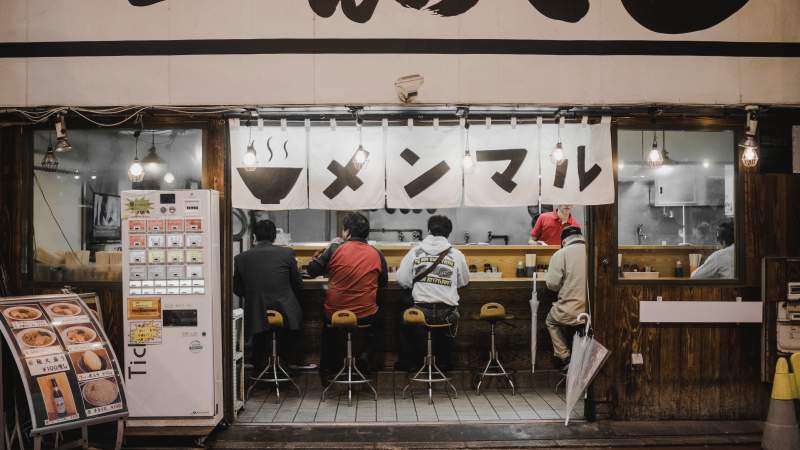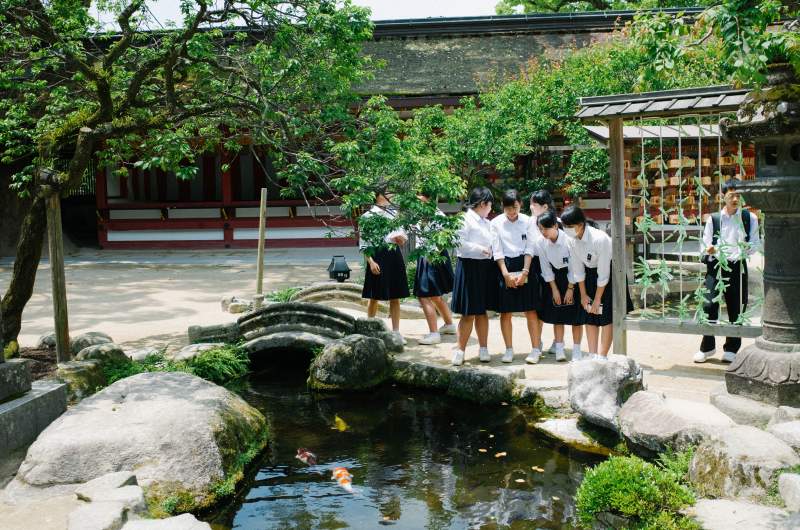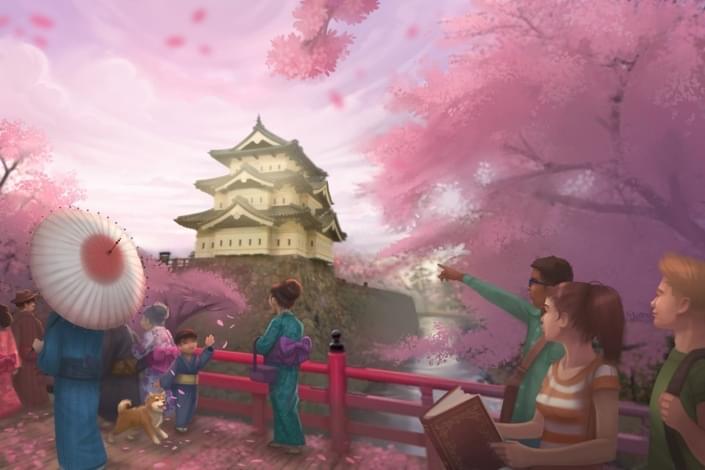
Whether you’re in the early stages of learning Japanese or you’ve been practicing for a while, the thought of having a conversation with a native speaker can be nerve-wracking.
I've been there plenty of times too. So I bet your inner monologue is along these lines:
- Will they understand? What if I say something wrong by accident?
- What do I do if I don’t have the vocab to say what I’m thinking?
These thoughts are perfectly normal reactions to doing something scary in Japanese, like chatting to a native speaker.
Thankfully, you can go into your first conversation armed with a ton of useful basic Japanese phrases.
Check out the rest of this article to learn 73 basic Japanese phrases that will serve you well in any Japanese conversation or when travelling in Japan.
These are also great starting points if you’re just jumping into Japanese for the first time. These basic Japanese phrases will be the backbone on which you can build your Japanese knowledge.
And as for how to say basic phrases in Japanese, take a look at this detailed guide to Japanese pronunciation.
Pro Tip
By the way, if you want to learn Japanese fast (including basic Japanese phrases) and have fun while doing it, my top recommendation is Japanese Uncovered which teaches you through StoryLearning®.
With Japanese Uncovered you’ll use my unique StoryLearning® method to learn Japanese naturally through story… not rules. It’s as fun as it is effective.
If you’re ready to get started, click here for a 7-day FREE trial.

Anyway, back to our basic japanese phrases and words…. let's discover what they are!
Table of Contents
8 Must-Know Japanese Greetings

When you meet someone for the first time, you tend to start out with a greeting like “Hello” or pleasantries like “It’s nice to meet you,” right? Japanese is full of simple Japanese greetings to start out a conversation.
If you're planning a trip to Japan, then the people you meet at your destination will be thrilled to hear you use these basic Japanese phrases, even if they're the only ones you know:
- #1 Konnichiwa (こんにちは) – Hello
- #2 Ohayou gozaimasu (おはようございます) – Good morning
- #3 Konbanwa (こんばんは) – Good evening
- #4 Moshi moshi (もしもし) – Hello (but only if you’re on the phone or something like Skype)
- #5 Ogenki desu ka? (お元気ですか) – How are you?
- #6 Genki desu (元気です) – I’m good/I’ve been doing well, thanks
- #7 Ohisashiburi desu ne (お久しぶりですね) – Long time no see
- #8 _______–san mo? (______-さんも?) – And you? (Hint: fill in the blank with your friend’s name. This is a great response to things like “How are you?” because you can say, “I’m good! And you?”)
5 Ways To Learn More About Your Conversation Partner

After you’ve greeted your new conversation partner, it’s likely that you’ll need to know more about them. Keep it rolling—you’ve got this.
- #9 Namae wa nan desu ka? (名前は何ですか) – What’s your name?
- #10 Watashi no namae wa _____ desu (私の名前は__です) – My name is ______
- #11 Doko kara kimashita ka? (どこから来ましたか) – Where are you from?
- #12 Watashi wa ______ kara kimashita (私は__から来ました) – I’m from __________.
- #13 Sou desu ka? (そうですか) – Is that so?/Really?/I see (Hint: this is a great thing to say after learning where someone is from, what they do, or other facts about their life.)
If you want to keep the conversation going and need some more expressions to help you out, check out these 28 Japanese conversation starters.

7 Essential Japanese Politeness Expressions

You’ve done great so far. You’ve introduced yourself, learned your friend’s name and maybe where they’re from. And now you’re ready to move on to other topics.
But first, try out some of these basic Japanese phrases to be polite so you can apologise, show off your good manners, and be polite at a restaurant before you tuck into a meal.
- #14 Arigatou gozaimasu (ありがとうございます) – Thank you
- #15 Douitashimashite (どういたしまして) – You’re welcome
- #16 Sumimasen (すみません) – I’m sorry/excuse me (Hint: you can use this for anything from apologising for stumbling into someone on the train to asking for help or asking for people to move out of your way.)
- #17 Gomen nasai (ごめんなさい) – I’m sorry (Hint: didn’t we already cover “I’m sorry”? Gomen nasai is less “excuse me” and more “I’m truly sorry from the bottom of my heart.” Use it if you knocked something over and broke it, not if you interrupted someone’s stroll to ask for directions.)
- #18 Yoroshiku onegaishimasu (よろしくおねがいします) – I’m in your debt! (Hint: this one isn’t used in its literal sense most of the time; it’s a way to say “thank you” to someone you are counting on or indebted to. For example, if you're starting out at a new job in Japan, you might introduce yourself and then add this at the end. You might also use it if you’ve asked someone a favour, such as to show you around or give you directions.)
- #19 Itadakimasu (いただきます) – Let’s dig in (Hint: say this before meals as a way to politely say you’re going to begin enjoying your food.)
- #20 Gochisousama deshita (ごちそうさまでした) – That was delicious (Hint: say this after meals as a way to say thank you.)
For more on Japanese culture, customs and politeness check out this post.
9 Ways To Get Clarification In A Japanese Conversation

You’ve been puttering along in a conversation for a while now! But what happens if everything you feared takes place and you get confused? First, remember not to panic.
Even in your native language, you probably have to ask people for clarification or to repeat themselves. You won’t offend anyone if you do the same in a foreign language. Memorise these basic Japanese phrases and just take it slow, one sentence at a time.
- #21 Eigo te iu no wa… (英語ていうのは) – And in English, that’s…?
- #22 Wakarimasen (わかりません) – I don’t understand
- #23 Shirimasen (知りません) – I don’t know
- #24 Wasuremashita (忘れました) – I forgot
- #25 Motto yukkuri kudasai (もっとゆっくり下さい) – Please go a little slower
- #26 Mou ichido kudasai (もう一度下さい) – Could you say that one more time?
- #27 Nihongo de perapera de wa nai desu (日本語でペラペラではないです) – I’m not very fluent in Japanese (Hint: you’re speaking Japanese already! So you can’t say “I don’t know Japanese at all,” right?)
- #28 ___ te iu no imi wa nan desu ka? (__ていうの意味は何ですか) – What does _____ mean?
- #29 Tetsudatte kuremasen ka? (手伝ってくれませんか) – Can you help me?

6 Can't-Live-Without Japanese Questions

Japanese is one of the easiest languages to ask questions in—so ask away! In order to make a question in Japanese, just add ka to the end of any sentence.
On top of that, though, there are a few question words that will make your conversations go a lot smoother. Plus knowing how to ask questions is essential for travellers in Japan if you need to find your way or get help.
- #30 Doko desu ka? (どこですか) – Where is it?
- #31 Itsu desu ka? (いつですか) – When is it?
- #32 Doushite? (どうして) – Why?
- #33 Dochira desu ka? (どちらですか) – Which one is it?
- #34 Nan desu ka? (何ですか) – What is it?
- #35 Dare desu ka? (だれですか) – Who is it?
Getting To Know Each Other In Japanese

Perfect! You’ve been talking with someone for a few minutes now, introducing yourself and asking any questions you need to know. Maybe you’ve found out your speaking partner’s name and you’re walking to a coffee shop together.
Now’s the perfect time to find out more about each other and maybe become friends. Try out some of these basic Japanese phrases to open up a whole new avenue of conversation!
- #36 Ima nanji desu ka? (今何時ですか) – What time is it right now?
- #37 Ima (今) – Now
- #38 Ato de (後で) – Later
- #39 Kyou (今日) – Today
- #40 Kinou (昨日) – Yesterday
- #41 Ashita (明日) – Tomorrow
- #42 Mainichi (毎日) – Everyday
- #43 Nansai desu ka? (何歳ですか) – How old are you?
- #44 Doko ni sundeimasu ka? (どこに住んでいますか) – Where do you live?
- #45 Kyoudai ga imasu ka? (兄弟がいますか) – Do you have siblings?
- #46 Ikura desu ka? (いくらですか) – How much does that cost?
- #47 Kore wa nan desu ka? (これはなんですか) – What is this?
- #48 Sore wa nan desu ka? (それはなんですか) – What is that?
- #49 Are we nan desu ka? (あれはなんですか) – What is that? (Hint: Use “kore” when something is close to you, “sore” when something is away from you but close to the person you’re speaking to, and “are” when something is far away from both of you.)
- #50 Toire wa doko desu ka? (トイレはどこですか) – Where’s the toilet?

11 Answers To Common Japanese Questions

You’ve been learning a lot about your new friend, but now the tables have turned—they’re the one asking you questions! How should you respond to many of the most common questions Japanese native speakers might ask you? Try these answers out.
- #51 Hai (はい) – Yes
- #52 Iie (いいえ) – No
- #53 Mada mada (まだまだ) – Not yet
- #54 Kamoshiremasen (かもしれません) – Maybe/I’m not sure
- #55 Tokidoki (時々) – Sometimes
- #56 Zenzen (全然) – Never
- #57 Itsumo (いつも) – Always
- #58 Taitei (たいてい) – Usually
- #59 Watashi wa _____ desu (私は__です) – I’m a _______ (Hint: you can fill this blank with anything you feel describes you. That might be a “student” (gakusei), “tourist” (kankoukyaku), or even “doctor” (isha)!
- #60 Daijoubu desu (大丈夫です) – That’s okay
- #61 Ii desu (いいです) – That’s good
A special note on the difference between daijoubu and ii. If someone is asking you if something is “all right,” daijobu is what fits there (think “We don’t sell that here; can I get you X instead?” to which you’d respond with “yes, that’s all right, I suppose”).
If you approve of something or find it nice, that’s the time for ii (think of your friend saying “Hey, we should go to that sushi place!” and you’re really excited to go there. If your friend suggested sushi but you really wanted ramen instead, that would be a case for just using daijoubu.)
5 Japanese Phrases For Special Occasions

What if you’ve found yourself speaking to a native Japanese person for the first time because you decided to go to a celebration or special event, like a birthday or festival? Here are a few useful basic Japanese phrases for almost any situation you might find yourself in.
- #62 Ki o tsukete (気を付けて) – Be careful (Hint: you might say this to someone going on a trip.)
- #63 Yoku dekimashita (よくできました) – Great job
- #64 Omedetou gozaimasu (おめでとうございます) – Congratulations
- #65 Tanjoubi omedetou (誕生日おめでとう) – Happy birthday
- #66 Kanpai (乾杯) – Cheers (Hint: you should really only go for this one if you actually have a drink of some sort in your hand.)

4 Types Of Japanese Goodbye
You’ve had a lot to talk about, but now the time has come to finish your Japanese conversation. How do you wrap things up?
- #67 Ja (じゃ) – Well (Hint: used in the sense of “well, I guess I’d better get going.”)
- #68 Sayounara (さようなら) – Goodbye (Hint: use only if you don’t plan on seeing them again. This is a more final “goodbye.”)
- #69 Ja, mata (じゃまた) – Well, see you (Hint: this is the much more common “goodbye.”)
- #70 Oyasumi nasai (おやすみなさい) – Good night
By the way, if you're based in Tokyo or elsewhere in Japan, but you're still looking for someone to speak to here are my 4 tips for finding a language partner in Japan.
3 Japanese Phrases To Use In Emergencies
I can’t wrap up a list of some of the most important phrases in Japanese without making sure you know a few of the words that could come in very handy. If you find yourself in serious trouble, use these basic Japanese phrases to call for help.
- #71 Tasukete! (助けて) – Help me!
- #72 Keisatsu o yonde kudasai! (警察を呼んで下さい) – Please call the police!
- #73 Kyuu kyuusha o yonde kudasai! (救急車を呼んで下さい) – Please call an ambulance!
Hopefully you never have to use these last three. But it’s always a good thing to remember them in case you need them.
FAQs About Basic Japanese Phrases
What are the 100 most common Japanese phrases with meanings?
#1 Konnichiwa (こんにちは) – Hello
#2 Ohayou gozaimasu (おはようございます) – Good morning
#3 Konbanwa (こんばんは) – Good evening
#4 Moshi moshi (もしもし) – Hello (but only if you’re on the phone or something like Skype)
#5 Ogenki desu ka? (お元気ですか) – How are you?
#6 Genki desu (元気です) – I’m good/I’ve been doing well, thanks
#7 Ohisashiburi desu ne (お久しぶりですね) – Long time no see
#8 _______–san mo? (______-さんも?) – And you?
#9 Namae wa nan desu ka? (名前は何ですか) – What’s your name?
#10 Watashi no namae wa _____ desu (私の名前は__です) – My name is ______
#11 Doko kara kimashita ka? (どこから来ましたか) – Where are you from?
#12 Watashi wa ______ kara kimashita (私は__から来ました) – I’m from __________.
#13 Sou desu ka? (そうですか) – Is that so?/Really?/I see
#14 Arigatou gozaimasu (ありがとうございます) – Thank you
#15 Douitashimashite (どういたしまして) – You’re welcome
#16 Sumimasen (すみません) – I’m sorry/excuse me
#17 Gomen nasai (ごめんなさい) – I’m sorry
#18 Yoroshiku onegaishimasu (よろしくおねがいします) – I’m in your debt!
#19 Itadakimasu (いただきます) – Let’s eat
#20 Gochisousama deshita (ごちそうさまでした) – That was delicious
#21 Eigo te iu no wa… (英語ていうのは) – And in English, that’s…?
#22 Wakarimasen (わかりません) – I don’t understand
#23 Shirimasen (知りません) – I don’t know
#24 Wasuremashita (忘れました) – I forgot
#25 Motto yukkuri kudasai (もっとゆっくり下さい) – Please go a little slower
#26 Mou ichido kudasai (もう一度下さい) – Could you say that one more time?
#27 Nihongo de perapera de wa nai desu (日本語でペラペラではないです) – I’m not very fluent in Japanese
#28 ___ te iu no imi wa nan desu ka? (__ていうの意味は何ですか) – What does _____ mean?
#29 Tetsudatte kuremasen ka? (手伝ってくれませんか) – Can you help me?
#30 Doko desu ka? (どこですか) – Where is it?
#31 Itsu desu ka? (いつですか) – When is it?
#32 Doushite? (どうして) – Why?
#33 Dochira desu ka? (どちらですか) – Which one is it?
#34 Nan desu ka? (何ですか) – What is it?
#35 Dare desu ka? (だれですか) – Who is it?
#36 Ima nanji desu ka? (今何時ですか) – What time is it right now?
#37 Ima (今) – Now
#38 Ato de (後で) – Later
#39 Kyou (今日) – Today
#40 Kinou (昨日) – Yesterday
#41 Ashita (明日) – Tomorrow
#42 Mainichi (毎日) – Everyday
#43 Nansai desu ka? (何歳ですか) – How old are you?
#44 Doko ni sundeimasu ka? (どこに住んでいますか) – Where do you live?
#45 Kyoudai ga imasu ka? (兄弟がいますか) – Do you have siblings?
#46 Ikura desu ka? (いくらですか) – How much does that cost?
#47 Kore wa nan desu ka? (これはなんですか) – What is this?
#48 Sore wa nan desu ka? (それはなんですか) – What is that?
#49 Are we nan desu ka? (あれはなんですか) – What is that?
#50 Toire wa doko desu ka? (トイレはどこですか) – Where’s the toilet?
#51 Hai (はい) – Yes
#52 Iie (いいえ) – No
#53 Mada mada (まだまだ) – Not yet
#54 Kamoshiremasen (かもしれません) – Maybe/I’m not sure
#55 Tokidoki (時々) – Sometimes
#56 Zenzen (全然) – Never
#57 Itsumo (いつも) – Always
#58 Taitei (たいてい) – Usually
#59 Watashi wa _____ desu (私は__です) – I’m a _______
#60 Daijoubu desu (大丈夫です) – That’s okay
#61 Ii desu (いいです) – That’s good
#62 Ki o tsukete (気を付けて) – Be careful
#63 Yoku dekimashita (よくできました) – Great job
#64 Omedetou gozaimasu (おめでとうございます) – Congratulations
#65 Tanjoubi omedetou (誕生日おめでとう) – Happy birthday
#66 Kanpai (乾杯) – Cheers
#67 Ja (じゃ) – Well
#68 Sayounara (さようなら) – Goodbye
#69 Ja, mata (じゃまた) – Well, see you
#70 Oyasumi nasai (おやすみなさい) – Good night
#71 Tasukete! (助けて) – Help me!
#72 Keisatsu o yonde kudasai! (警察を呼んで下さい) – Please call the police!
#73 Kyuu kyuusha o yonde kudasai! (救急車を呼んで下さい) – Please call an ambulance!
#74 Suki desu yo (好きですよ) – I like this
#75 Daisuki desu yo (大好きですよ) – I love this
#76 Kirai desu (きらいです) – I dislike this
#77 Daikirai desu (大嫌いです) – I hate this
#78 Suki demo kirai demo nai (好きでも嫌いでもない) – I don’t like or dislike this
#79 Maamaa (まあまあ) – It’s okay/so-so
#80 Dame desu yo (だめですよ) – That’s bad/don’t do that
#81 Mondai nai (問題ない) – It’s not a problem
#82 Iroiro (色々) – Various/many
#83 Mata sugu ni kimasu yo (またすぐに来ますよ) – We’ll meet up soon
#84 Mada tabeteimasen (まだ食べています) – I haven’t eaten yet
#85 Tabete mitai (食べてみたい) – I want to try this [food]
#86 ____ ga taberaremasen (__が食べられません) – I can’t eat that
#87 Arerugi ga arimasu (アレルギーがあります) – I have an allergy
#88 Betsu betsu onegaishimasu (別々お願いします) – Split the check, please
#89 Kurejitto kaado ii (クレジットカードいい?) – Is credit card okay?
#90 Iie, kekko desu (いいえ、けっこです) – No, that’s all right
#91 Fukuro ni iremasu ka (袋に入れますか) – Do you need a bag?
#92 Yattaa (やったあ) – Yay!
#93 Yabai (やばい) – That’s bad
#94 Maji de (まじで) – Really?
#95 Yappari (やっぱり) – Of course/as I thought
#96 Omochikaeri de (お持ち帰りで) – Takeout
#97 Nani (何) – What
#98 Yoiko (良い子) – Good boy/girl (in the sense of praising a dog)
#99 Okawari (おかわり) – Another serving
#100 Irasshaimase (いらっしゃいませ) – Welcome
What are basic Japanese sentences?
Some basic Japanese sentences that everyone should know are:
元気ですか?Genki desu ka? How are you?/Are you well?
いくらですか?Ikura desu ka? How much does this cost?
私の名前は___です。Watashi no namae wa _____desu. My name is _______.
What are 10 Japanese words?
Ten of the most common Japanese words are:
1. ありがとう(arigatou – thank you)
2. すみません (sumimasen – excuse me/I’m sorry)
3. こんにちは (konnichiwa – hello)
4. はい (hai – yes)
5. いいえ (iie – no)
6. ―さん (-san – attached to the end of anyone’s name to show respect)
7. 失礼します (shitsurei shimasu – excuse my rudeness [when entering or leaving a person’s space, like a home or office])
8. いってきます (ittekimasu – I’m leaving)
9. ただいま (tadaima – I’m home)
10. おやすみ (oyasumi – good night)
What is a popular Japanese phrase?
The most popular Japanese phrase is ありがとうございます [arigatou gozaimasu], which means “thank you.”
Your Next Steps In Japanese

So there you have it: all of the basic Japanese phrases you need to help you discover and start using the Japanese language.
With these basic Japanese phrases in your back pocket, you'll soon find yourself having your first basic conversations with native speakers and getting excited about developing your conversational Japanese.
So now that you’ve learned the basics, are you ready to take the next step in your Japanese adventure?
I'm a big believer in the power of story to enable you to learn a foreign language. That's why I've created Japanese Uncovered, a course that takes you from beginner all the way to an Intermediate level, with my unique StoryLearning® method.
Thanks to StoryLearning®, you learn Japanese naturally through story… not rules. It’s as fun as it is effective.Along the way you'll learn all of the Japanese vocabulary you need for everyday conversations, as well as how to read, write and pronounce Japanese correctly.
If you’re ready to get started, click here for a 7-day FREE trial.
The Key To Stress-Free Japanese Conversations

If you’ve mastered even a small number of the basic Japanese phrases in this article, you’ll be well on your way to holding a solid conversation with any native speaker you might happen to encounter at home or when you travel.
In language learning, you don't need to re-invent the wheel each time you speak to someone new. Nor do you have to come up with all your answers on the spot.
Try thinking about your answers to some native speaker questions beforehand so you can find the right words (like your age, occupation, and country or language name) to describe yourself! Use these basic Japanese phrases to help you.
When you know what to expect, and you've prepared in advance, you'll find that conversations with native speakers go much more smoothly. And most importantly, you'll feel more confident about speaking in Japanese.

Olly Richards
Creator of the StoryLearning® Method
Olly Richards is a renowned polyglot and language learning expert with over 15 years of experience teaching millions through his innovative StoryLearning® method. He is the creator of StoryLearning, one of the world's largest language learning blogs with 500,000+ monthly readers.
Olly has authored 30+ language learning books and courses, including the bestselling "Short Stories" series published by Teach Yourself.
When not developing new teaching methods, Richards practices what he preaches—he speaks 8 languages fluently and continues learning new ones through his own methodology.









































